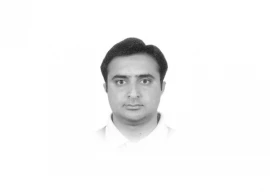
ISLAMABAD:
The Bibliophile Award is deceptive, 2011 winner Ghazi Salahuddin argues, because “no one can know who has read the most books at a given place and time.” The award goes to literary connoisseurs who have read and collected more books than anyone else in the country.
Speaking to The Express Tribune, he attributed his win to his affiliation with educational television programmes such as “Geo Kitab” on Geo TV and prominent PTV game show “Kasuti”. Television arguably reaches more people than the written medium, he said.
Like many educationalists and intellectuals, Salahuddin is disappointed with the falling reading habits in the country, saying “something is profoundly deficient about our country’s reading habits, which fill in intellectual, educational, societal and cultural deprivations.”
He feels that the lack of literacy and low quality of education are contributory factors in poor readership, which feeds intolerance and extremism.
“Reading is a way to step into the minds and lifestyles that are different from your own, making one more tolerant and empathetic,” said Salahuddin, adding that he is “constantly agonised” by the inability of the educational system to inculcate this habit within students. Reading material outside of one’s comfort zone will help students in defending their own views when opposed, while at the same time learning from others.
In grappling with the Urdu/English language medium as well as the vast disparity of resources within classes, Salahuddin said, “We have lost our voice and education is no longer the greatest equalizer.”
A keen reader of both English and Urdu, and appreciating how the dominance of English has introduced another layer to Pakistani literature, he argues that reading irrespective of language is the important thing.
Unlike most bibliophiles who principally argue for classics, Salahuddin says subject matter is not important — that reading is an act of engaging with literature. “People sometimes don’t read altogether because they pressurise themselves into reading what is popular and not what they enjoy,” he said.
Though a fan of poetry and fiction, in his daily three-hour reading routine, he admittedly reads more political literature due to his journalism background. Journalism, Salahuddin says is an interesting and varied form of literature in its own right and is one that has afforded him with new encounters. “You learn something new every day in this profession,” he added.
Technology coming in the way of readership is an excuse and not a valid argument as the fast availability and mobility of literature in the forms of ebooks can only benefit readers, Salahuddin said. However, “the romantic quality of holding a book in your hands, turning the page and scribbling notes is irreplaceable,” he said, adding that technology should not be considered a threat because books will never die.
Salahuddin concluded by saying that when he encounters “young people who don’t read poetry or fiction, I have to ask how can they love if they don’t read.”
Published in The Express Tribune, April 28th, 2012.



































































COMMENTS
Comments are moderated and generally will be posted if they are on-topic and not abusive.
For more information, please see our Comments FAQ